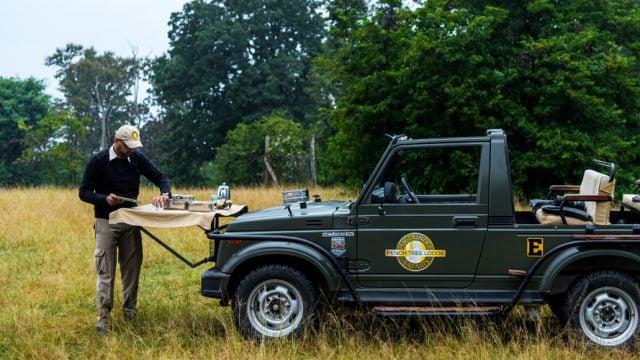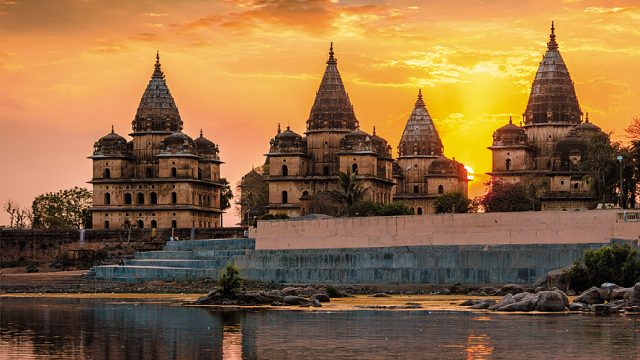For many of us city-dwellers, a man-cub named Mowgli provided our first interaction with the wild. In The Jungle Book, Rudyard Kipling’s lifelike characters run free in the jungles of Seonee—a fictional forest modelled on the jungle adjoining the Seoni district; a jungle we now know as Pench National Park.

More than a century after the story was written, I feel lucky to venture into the 758-sq-km park. Entering from the Turia Gate, I’m on a morning game drive with Taj Safaris.
The regal tiger dominates this land, capturing the imaginations of every visitor who passes through its teak and mahua forests. At last count, 57 tigers roamed Pench—a number that has been slowly rising over the last few years.
Morning mist sits low on the ground. The previous night’s raindrops form diamonds on the leaves. At the very beginning of the season, when the monsoon hasn’t quite bid farewell, the grasses are tall, the jungle a tangle of flourishing teak, mahua, tendu, and scaly-barked saja trees. Invasive lantana bushes press in on the safari trails, undoubtedly concealing animals that may be mere metres from us. With plenty of green cover, sightings will be difficult.

As the forest shakes off its slumber, langurs and rhesus macaques hidden in the dense canopy begin to stir. “In a fight between the species, the macaque usually prevails,” says Taj Safaris’ naturalist Sohel. A jungle fowl’s caw precedes the flash of its bright red plumes within the foliage. A little jungle quail—a ground bird—emerges from the grasses on foot. The brightest streak of turquoise signals an Indian Roller in flight.

Dense foliage morphs into a ghostly avenue of brown webbed trees. Mottled and stripped of their colour, the teak leaves are mere shadows. It reminds me of how, as a child, I’d press leaves into my books to get the same effect. “Skeletonizer caterpillars have been at work,” Sohel tells us.
At a meadow in Alikatta, we pull up alongside other jeeps and disembark to enjoy a packed breakfast under a sprawling tamarind tree. The site of the relocated Alikatta village is the park’s designated breakfast spot, and elephant camp, where the pachyderms that patrol the forest stay.
Refuelled, we head to the high banks of the swollen Pench River, which neatly divides the park in half. I train my binoculars to see a grey-headed fish eagle swoop down to the water, eliciting an alarmed squawk from a nearby peacock. A black ibis suns itself on a boulder, as cormorants and egrets glide down beside it. A cluster of Indian vultures sit perched on bare branches. Clearly, this is a hangout par excellence for avid birders.

There is no sign of the big cat, but I’ve started to identify birds, learnt about trees, and heard fascinating tales of the forest. The best piece of advice I got before my trip to Madhya Pradesh was to “always enter the forest with an open mind.” Without the weight of my own expectations, the jungle proves to be an intriguing place, where even the smallest of creatures has a role to play.
It’s no secret that our forests hang in delicate balance, with poaching, human encroachment, and man-animal conflict posing large threats. The demanding business of tiger spotting puts immense pressure on these fragile environments. A pressure that visitors like us can help mitigate if we allow the people who know this wilderness—the naturalists and local park guides—to introduce us to the wonders of this land beyond the striped cat.

The naturalist relates tales of sloth bears getting woozy on too much mahua, and racket-tailed drongos mimicking raptors to hog a share of worms. Giggling at his anecdotes, I haven’t realized our vehicle is crawling along at snail’s pace.
In a bid to regulate park activity, the Forest Department has introduced a GPS tracking app, Bagheera Hejje (hejje means “pugmark” in Kannada). Pench is the first of Madhya Pradesh’s park’s to introduce the app on park guides’ smartphones. The app ensures routes are not violated, tracks jeeps’ stoppage time, and curbs overspeeding. Speeds are limited to 20 km/hr, which, I’m shocked to learn, is the limit across all India’s national parks. I think of previous safaris around India, where jeeps have hurtled full-throttle to “catch” a tiger in action, trampling foliage in their wake. Currently in effect only at Turia Gate, the app is a definitive step in the right direction.
Driving slowly, I absorb the forest as it is meant to be experienced, through all of my senses. I breathe in the smell of petrichor, and the heady whiff of lantana. The soundtrack I’m listening to is ever-changing: the whoop of a dominant male langur marking his territory, the squabble of jungle babblers, the chirrup of a white-naped woodpecker. Images imprint themselves in my mind: the green and red of a plum-headed parakeet, golden sunlight filtered through humongous spider webs.

The next morning, I drive in from the Karmajhiri Gate, with Pugdundee Safaris’ naturalist Gaurav Dhotre. The forest is as languorous as the sloth bears hibernating in its caves. At every fork in the road, Gaurav stops to listen to the forest, but it yields only ghostly silence.
We wind past rocky outcrops and deep gorges—the kind that Akela and his pack of wolves inhabited in Kipling’s story. “Leopard country”, says Gaurav. The stealthy cat prefers to live, unseen and unheard, in rocky terrain. Jeeps stop to exchange notes and talk of tigers like they are old friends.
“Have you been to Collarwali’s territory today?” is a common question. The “queen of Pench” earned her moniker, Collarwali, for her radio collar. The 12-year-old tigress is credited with single-handedly lifting Pench’s tiger population, raising around 26 cubs since 2008.
Our quiet spell breaks when a pair of slant-eyed jackals slink out of the grassland and swagger ahead of us, throwing us disdainful looks. Further down, a hulking shape appraises us curiously. Sinewy muscle, a glossy ebony coat, curved horns, ears perpendicular to her face, white stockings. The formidable gaur or Indian bison—often weighing up to a 1,000 kgs—is among the largest species of land animals. The mother gaur crosses in front of us, followed slowly by two hesitant calves. Gaur are known to use the Kanha-Pench forest corridor and migrate between the parks. Nearby, a female nilgai and her calf browse for low-hanging leaves.

The rewards of an intimate, immersive jungle experience are unmatched. I come away thrilled than I can differentiate between the similar trunks of the crocodile bark and tendu trees, and grateful to have spotted so much bird and animal life. We may not have crossed paths with Collarwali or her progeny, but with the healthy population of prey I’ve seen, I know she will traverse these paths soon, hopefully with her next litter.
THE INFORMATION
Getting there: The nearest airports and railheads to Pench National Park are Nagpur (130 km/3 hrs) and Jabalpur (210 km/4 hrs).
Safaris
Pench National Park does not have zones, but designated routes instead, accessible from the popular Turia Gate, and the much quieter Karmajhiri and Jamtara gates.
Open: Oct 1- Jun 30.
Hours: Twice daily safaris from 6 a.m to 11 a.m. and 3 p.m. to 6 p.m., subject to slight changes per season. Closed on Wednesday afternoon
Entry: Although most visitors choose to book safaris through their lodge it is possible to book independently. Book permits online at forest.mponline.gov.in; Entry permits per jeep cost ₹1,500. Each jeep seats six. Guide charges are ₹360 or ₹500, depending on their grade. Vehicle charges are extra. Vehicle and guide charges are payable at the gate, shared by all occupants of the jeep.
Website: penchtiger.co.in
Tip: For the best safari experience with the best trained naturalists, book through your lodge.
Stay
Taj Baghvan (Turia Gate)
Address: Baghvan, Pench National Park, Village Awargani, Post Duria, Tehsil Kurai, District Seoni, Madhya Pradesh – 480881
Tel: 022-66011825
Website: taj.tajhotels.com/en-in/baghvan-pench-national-park/
Tariff: Doubles from ₹37,920 per night, including all meals; plus taxes. Rates are dynamic and also vary by season. Shared safaris cost ₹3,000 plus taxes per person.
Pench Tree Lodge (Karmajhiri Gate)
Address: Pench Tree Lodge, Pench National Park, Gram Sarrahirri, Tehsil Kurai, Seoni, Near Karmajhiri Gate
Website: www.penchtreelodge.com
Tel: 0124-2970497
Tariff: Tree house doubles cost ₹16,000 per night inclusive of all meals and taxes; add-on one (shared) jeep safari for an additional ₹4,000 per night.
The Jungle Book
Taj Safaris
Madhya Pradesh


